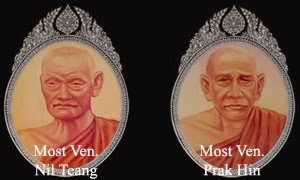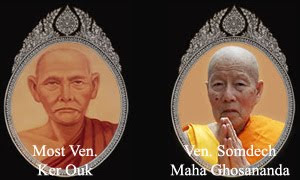About 10,000 people including 480 Buddhist monks, laypeople and other people from government officials, parliamentarians and senators have gathered and celebrated Visaka Bochea Day Festival which is the full moon day of sixth lunar month at the Phnom Preah Reach Troap-Udong in Ponhear Loeu district in Kandal province on 28 April, 2010.
The celebration of Visaka Bochea Day 2554 was organized by the Ministry of Cults and Religion and the National Committee for Organizing National and International Festivals (NCONIF), and presided over by Samdech Heng Samrin, President of the National Assembly to respect the Buddha Lord who passed away 2554 years ago.
Samdech Heng Samrin said that Visaka Bochea Day is the most important traditional ceremony in the Buddhism in Cambodia. It is a ceremony that Cambodian people in the country always celebrate in the monasteries every year with pleased minds on full moon day of Visaka month for the Buddha’s Memorial Day.
“Every year, Cambodia is very happy to celebrate Visaka Bochea Day to respect and remember our Buddha Lord’s enlightenment and passing away in the world. This year’s celebration has been well organized and progress and there are so many people who have participated in the event,” he told The Southeast Asia Weekly during an interview at the celebration at Phnom Preah Reach Troap in Udong district, Kampong Speu on April 28.
Due to the full peace, political stability, development and the progress, all religions especially Buddhism now has been developing in Cambodia, and the Buddhism has taken such a deep root in the hearts of culture and tradition in Khmer people, he said, adding that for this year’s celebration, the Royal Government also accepted the duty as a house owner in the role of Buddhism country among other countries in the world in order to celebrate the ceremony of the “4th Trail of Civilization” on the full moon day of Visaka Bochea on the 28th of April at Bayon Temple in Siem Reap province.
Samdech Preah Sangkareah Bou Kry, Leader of the Dhamayut Buddhist sect in Camnbodia, said that that Visaka Bochea Day is very important for all Buddhist followers in the world. It has also officially recognized by the United Nations (UN) as the World Heritage Day on December 13, 2009. Samdech added that Visaka Bochea is celebrated in order to remember three important events in which when Buddha was born into the world, when the Buddha attained enlightenment, and he passed away.
“Today, Buddhism is already 2554 years old, having become a very large part of the heritage in Asia, still strongly stands and being venerated by hundred thousands people in the world, especially Khmer citizens,” he told The Southeast Asia Weekly on April 27 in Phnom Penh.
Samdech stated that Visaka Bochea Day, all Khmer people including the King, leaders of the Royal Government, Buddhist monks in all ranks and all Buddhist lay devotees with happy faces and beautiful clothes, the hands holding various worshiped things such as followers, joss sticks and perfumes to worship the Buddha whose relics enshrined in a stupa erected on the mountain of Preah Reach Trop or Attharassa in the area of Udong Mountain, Ponhea Loeu district in Kandal province.
Regarding to the history of Visaka Bochea Festival, he said that this traditional ceremony has been practiced by Khmer people from generation to generation since Buddhism was brought to the land of Sovannaphumi by the two elder Buddhist monks known as Sonatthera and Uttharathera.
Cambodia chronicles mentions that the Buddha’s relic was brought to Cambodia since 1957 by former King Norodom Sihanouk. The former King Norodom Sihanouk obtained the Buddha’s relic from India and the relic was initially enshrined in Phnom Penh, former stupa located in front of the Railway Station in Phnom Penh today.
After the construction of new stupa was begun on the mountain of Preah Reach Trop in Udong in 1996, on the full moon day, month of Migasira, 2546 B.E or on the 19th December 2002, the King Norodom Sihanouk, the two leaders of Buddhist Sects, Buddhist monks, and government officials in all ranks with a congratulation of many people marched and brought the sacred relics from Phnom Penh to enshrine in the stupa where it has been completely built at the mountain of Preah Reach Trop or Udong.
According to Samdech Preah Sangkareach Bou Kry, the profound meanings of Buddha’s teachings including the consequence of practices in Dharma, it makes wholesomeness that is a good state rooted in minds through the theory of Kamma and pointed out the way for practice which is referred to the Eightfold Noble Path and leading those who insert an effort, possibly attain peacefulness throughout the mental, verbal, and physical practice until the peace, mutual tolerance from even a small family up to the whole society and the world.








